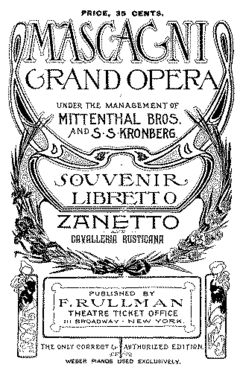Zanetto
| Zanetto | |
|---|---|
| Opera by Pietro Mascagni | |

Cover of the souvenir libretto printed for the first New York performance 1902
|
|
| Librettist | |
| Language | Italian |
| Premiere | 2 March 1996 Liceo Musicale Rossini, Pesaro |
Zanetto is an opera in one act by Pietro Mascagni to an Italian libretto by Giovanni Targioni-Tozzetti and Guido Menasci. It received its first performance on 2 March 1896 at the Liceo Musicale Rossini in Pesaro. Only 40 minutes long and with cast of two singers, Zanetto was originally described by its composer as a scena lirica (lyric scene) rather than an opera. It is set in the countryside near Florence during the Renaissance and tells the story of an encounter between a beautiful courtesan, Silvia, and a young wandering minstrel, Zanetto. The libretto was adapted from an Italian translation by Emilio Praga of François Coppée's play Le passant (The passer-by) in which the young Sarah Bernhardt had won fame in the en travesti role of Zanetto.
Zanetto represented a return by Mascagni to the one-act format of his first opera Cavalleria rusticana, which had premiered in 1890. However, the Renaissance setting of Zanetto was a far cry from the gritty contemporary story he used for Cavalleria rusticana, the work that made him famous. By 1893, Mascagni was simultaneously working on three operas: Vistilia, based on a novel by Rocco de Zerbi set in ancient Rome;Guglielmo Ratcliff, which he had first started composing in 1882; and Zanetto, which his publisher, Edoardo Sonzogno, envisioned being performed in future double bills with Cavalleria. Mascagni finally finished Zanetto in October 1895. It was premiered on 2 March 1896 as part of the annual celebrations in honour of Rossini's birthday at the Liceo Musicale Rossini in Pesaro, where Mascagni was now the director. Two of the conservatory's students, Maria Pizzagalli and Stefania Collamarini, sang the roles of Silvia and Zanetto. The opera was then staged at La Scala on 18 March with the same cast. Although the opera had been enthusiastically received in Pesaro, the reception at La Scala was lukewarm. Edoardo Pompei, a music critic and early biographer of Mascagni, ascribed this to the slightness of the work which was magnified in large theatre such as La Scala accustomed to grandiose productions:
...
Wikipedia
